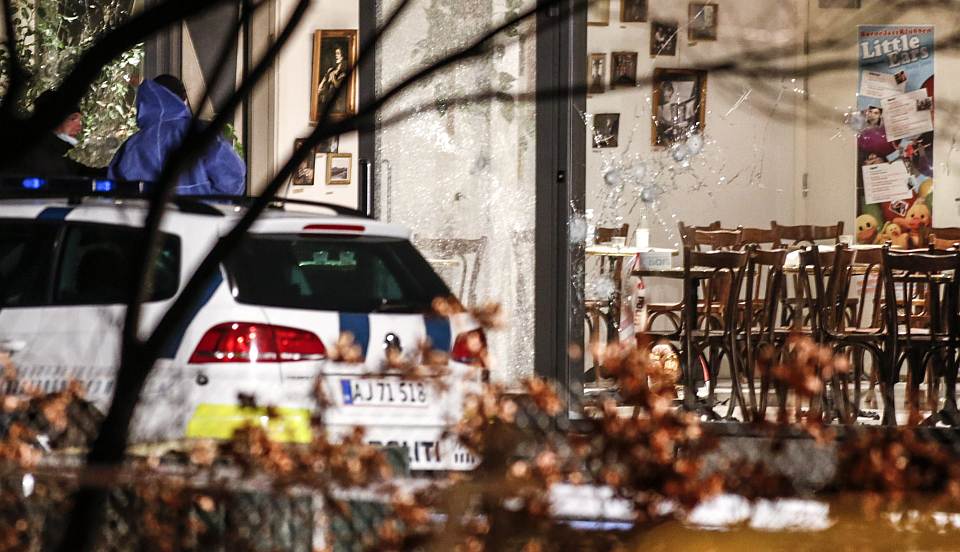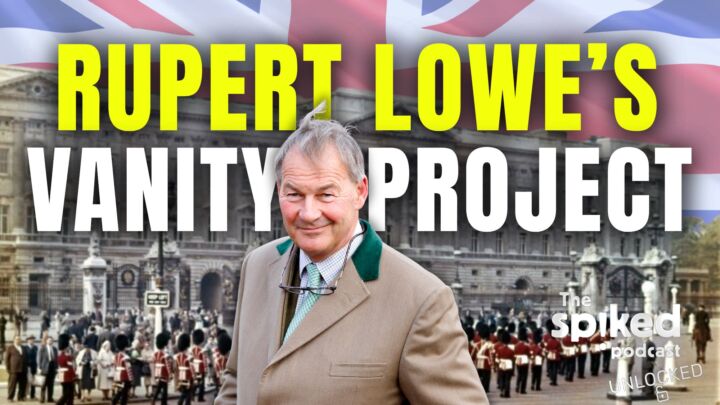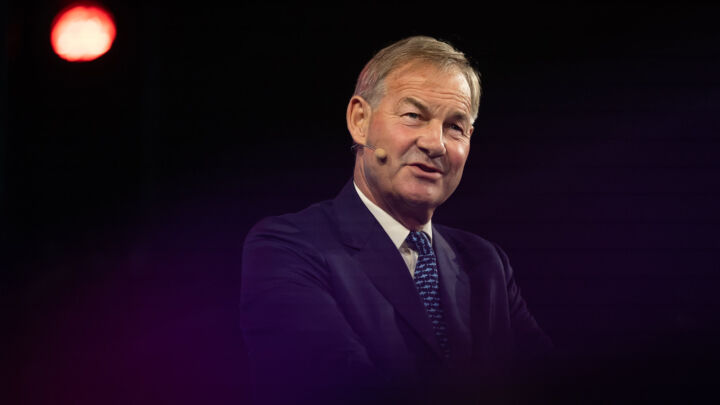Islamism and identity politics – a destructive mix
The strange alliance between leftists and extremists is eroding free speech.

Want unlimited, ad-free access? Become a spiked supporter.
On 14 February 2015 an Islamist gunman attacked a café in Copenhagen where a debate on free speech was being held. Speaking at the meeting was Swedish artist Lars Vilks, who received death threats after he drew cartoons in 2007 of the Prophet Muhammad that were considered insulting by some Muslims (and some non-Muslims). Vilks was unhurt, but a documentary filmmaker, Finn Nørgaard, was killed. A month earlier, Islamists murdered cartoonists at Charlie Hebdo in Paris. On one level, the Danish attack was prosaically ineffective. On another level, it marks a new standard, where anyone associating with ‘insulters of the prophet’ can expect to be a target for extremists.
This essay will not discuss the cartoons of Vilks and Charlie Hebdo. Instead it will evaluate what recent assaults on controversial art and satirical journalism – and the assaults yet to come – mean for the arts in the West. It is also worth considering how Islamists – some of them born and raised in wholly (or largely) secular European countries – have not rejected Western values, but have absorbed aspects of Western secular culture. This essay cannot be a full account. Though arguments and positions here are simplified, they are not – hopefully – misrepresented.
In this essay, ‘Islamism’ is used to refer to ‘the assertive application of Islamic principles to political and social spheres’, as differentiated from Islam practised as a private ethical code; ‘extremist’ is a personal will to use violence and the threat of violence to achieve one’s aims; and ‘post-liberal’ is used as an adjective to describe the uneasy consensus between mainstream socio-political strands in Western societies, one which accommodates identity politics and encourages constraints on speech – voluntary and otherwise.
Civility and censorship
In recent months, a common refrain of many commentators and journalists has been: ‘The murder of the Charlie Hebdo cartoonists was wrong, but…’ Many felt that cartoonists who had the freedom to ridicule Muhammad should not have exercised that right. The inference is that freedom to be irresponsible is not freedom from consequences of irresponsibility. Some of the cartoons were puerile and juvenile, but there is plenty of material in that class – public lavatory walls and internet websites are full of it. The difference is that the cartoons had authors’ names attached, and there was a particular address where they could be found.
It seems that, today, people who deliberately set out to insult Islam can expect reprisals. Although there is a case to be put that we should protect reckless individuals as a matter of principle – and this essay will not argue against that – it is more important that we consider the murders as (at least partly) an extreme manifestation of the climate of accommodation that already compromises our liberty and affects us as citizens, readers and makers of art.
As we have seen in the pages of arts journals (notably The Jackdaw and The Art Newspaper) and on spiked, the practice of pre-emptive censorship has become an ever-present reality. Formerly we relied on institutions to promote and protect difficult art, whereas nowadays institutions anticipate, rather than react to, criticism. What goes undiscussed is the self-censorship which occurs daily in the lives of satirists, artists and writers. We have all held our tongues in everyday life when we thought speaking out would cause more harm than good. When standing up for one’s ideas involves placing others in harm’s way, one naturally grows more tentative. Where you might risk your own safety, you often find you cannot risk that of your family and colleagues. Though – in at least some cases – isn’t the protecting-my-colleagues/family defence (albeit a legitimate one) actually a way of excusing oneself from taking an unpopular stand?
One problem with the on-their-heads-be-it reasoning is that it implicitly accepts that violent retaliation to an actual (or perceived) slight is regrettable but inevitable. Does that line of reasoning also apply if militant Jews were to firebomb publishers of the Koran, or radical socialists were to murder BNP members? Doesn’t such reasoning, however indirectly, excuse intimidation and vengeance by any self-identifying group of victims against their putative insulters? Are Muslims not to be held to the same standards as the society they are a part of? Are we to consider Muslims incapable of exercising self-restraint or obeying state laws? Yet this special pleading – that outsiders can never understand the members or culture of a subset, something that renders that culture unknowable and beyond universal principles – is very much a part of identity politics that robs individuals of autonomy, turning them into puppets of social conditions and hereditary circumstance.
Another problem with pre-emptive censorship for the sake of protection is that it is effectively impossible. The Charlie Hebdo cartoonists knew they were creating provocative images and could expect a backlash. Consider the case of Salman Rushdie. His book The Satanic Verses is a work of literary fiction. It included references to Muhammad dreamed by a fictional character in a delirium. It led to a fatwa being issued against Rushdie, subsequent attacks against publishers and the murder of a Japanese translator. Rushdie and his colleagues had no reason to expect that instances of blasphemous delirium in a work of fiction might provoke violent hostility. Due-caution caveats cannot be applied in practice as there is no way of predicting how any work of fiction or art touching on Islam may be represented or misrepresented by extremists. The only way to be safe from extremists is never to say anything that touches upon religious culture, never associate with anyone who has and never be in the vicinity of an exploding bomb. But even that position will not hold.
Even if you avoid opposing extremists, the restrictions they force on others will affect you. Furthermore, accommodation will not work because Islamist demands will never end. Even if another image of Muhammad is never exhibited or published in the UK again, extremist pressure will continue, applied in other areas of the arts. Images seen as denigrating Muslims (especially Muslim women) will be targeted; ‘disrespectful’ art by artists of Muslim heritage will be threatened; artists who take an avowedly atheist stance will be subject to violent protest. There is no way of following ‘rules of safe speech’, because extremists make rules arbitrarily, opportunistically and unilaterally. What may be halal today may be haram tomorrow , with no possibility of reasoned appeal.
How can the apparently alien outlook of the Islamist radical find any succour in secular Western society? To understand how an extremist can be nurtured by a schismatic environment – part Muslim immigrant culture, part secular European – we have to consider the way social discourse in modern Britain changed in the 1970s and 1980s.
Identity politics
Identity politics came to prominence in the late 1960s as a response to the failure of the Western political left to create fundamental social and economic change. The disillusionment with the ideology and Marxist economic analysis of the Old Left – particularly after the failed protests of 1968, and in the light of increasingly militant civil-rights and gay-rights movements – gave birth to the New Left. The New Left rejected the Old Left principles of universality extolled by the Enlightenment, which held that inalienable rights sprang from shared humanity, and that one made allegiances by choosing a political stance, rather than conforming to oppressive and debilitating divisions along national, gender and religious lines. By contrast, the New Left felt that rights reform relating to sub-groups could be a more effective means to drive social change.
From this point on, social conventions began to change in ways that have been accepted even by the political right. People are increasingly evaluated as constituents of subset classifications, defined by race, ethnicity, national origin, religion, gender, disability and sexuality. Social constraints that were loathed by the universalist Old Left are fetishised by the factionalist New Left. Certain subsets are resented by the right, other subsets resented by the left, but what neither side does is question the validity of identity politics, merely the value of advantaged or disadvantaged groups, and which factional interests should be resisted or promoted.
Crucially, these determining labels are matters that individuals have little or no agency over. Humanity is no longer seen as a uniting quality; the worth of an individual was measured by the assumed privilege or disadvantage of his or her subset(s). When individuals’ worth is measured by their birth subsets, individuals become essentially passive. People no longer gain respect and authority through education, skills, building relationships and contributing to society. Identity politics is exactly the opposite of empowerment – it infantilises by reducing individuals to passive victims in need of protection. Individuals are encouraged to reduce themselves to sheer helplessness. They become unable to avoid distasteful material, unable to bear the thought of others experiencing it, unable to allow it even to exist. And that final sentiment leads to censorship.
The preface ‘As a woman/African-American/Muslim/gay man, I…’ is used as an a priori authority for subsequent statements. Being a member of minority subsets lends a speaker supposed authoritative or authentic insight, and leads him or her to demand redress as a victim of systematic oppression, institutional discrimination or casual offence. Conversely, certain subsets (male, heterosexual, white) are viewed by post-liberals as less authentic and valued due to historically inherited privilege. The language of victimhood now dominates political discourse. The statement ‘I am offended by…’ now carries weight in debates when all it demonstrates is the capacity of the speaker to articulate a temporary and subjective position – one that is as incontrovertible and inarguable as it is substantially meaningless. Rather than points being argued between equals on the basis of logic and evidence, common discourse is now between representatives of inherently unequal subsets and hinges on depth of feeling.
Now that emotional response has been accorded the status of a legitimate, quasi-legal grievance, why should a religious person who expresses genuine (or tactical) offence be denied redress? When a fundamentalist is denied parity by authorities that advocate ‘a respect agenda’, but cannot legally curtail blasphemy, is it any wonder he sees double standards? Post-liberal identity politics promises emotional justice, but it betrays its own partiality. It supports favoured minorities under the auspices of ‘hate speech’, but hesitates to censor blasphemy. Encouraging individuals to validate themselves through identifying with cultural subsets – and maintaining a double standard separating anti-religious speech from hate speech – strengthens the agenda of Western Islamists.
The way to establish impartiality and strengthen free speech is: 1) for state organisations and politicians to disengage from identity politics and refuse to endorse emotional grievance as a matter for civil or criminal legislation; and 2) for the rescinding of laws regarding hate speech, prevention of the ‘glorification of terrorism’, blasphemy and all restrictions on speech that fall short of incitement, harassment, threatening behaviour and other criminal acts.
There is little likelihood of this proposal being taken up, as these changes conflict with the will of the (apparent) majority of the populace and political class. Nonetheless, the principles of identity politics and restrictions on free speech deserve to be opposed, because they are intellectually flawed, morally invidious and practically counterproductive.
Towards thought reform
If that picture of identity politics and policed civility seems exaggerated, think back 20 or 30 years. Would you then have expected people to be sacked from positions in public and private organisations for expressing contentious political or social opinions, even in private settings? Now, those accused of infractions of civility are only offered the possibility of rehabilitation if they express sufficient contrition. These sound like the tactics of totalitarian regimes, where enforced self-criticism and public shaming were used to suppress dissent and discredit troublesome individuals.
However, these are now the norms we have grown to expect in Western democracies. The idea of ‘hate speech’ today is akin to the catch-all terms, such as ‘counter-revolutionary activity’, used to smother political criticism in dictatorships. In modern Britain, it is unremarkable to be publically shamed for a drunken remark, not so much for the words, but the thoughts expressed. Whether or not speech crime is punished as a matter of politics or politesse makes no practical difference. Likewise, it is irrelevant whether punitive sanction is enforced by legal authorities or social opprobrium. It is still the imposition of the tyranny of the majority on the minority.
The point is not whether we judge racism, creationism, Islamism, banning abortion and so forth to be wrong; what matters is whether we are allowed to discuss such things openly. Once we forfeit our right to speak about (and listen to) controversial matters, we forgo our critical intelligence. In allowing the limitation of free speech, we give up an important part of what makes us human. What’s more, such a restriction will soon enough be used against the leftists and liberals who champion enforced civility. Listening to a foolish opinion is not ‘giving it legitimacy’, in the post-liberal parlance, for how can we test our ideas without arguing for them and against their opposites? How can we know the truth without investigating a spectrum of possibility? How is an untested principle qualitatively different from an inherited prejudice?
We live in a multicultural society where people do not mix but live parallel lives surrounded by their own kind, and educated in single-faith schools. And, at the same time, the public arena has become ever-more anodyne. This is today’s political and social climate, where rather than ridicule and out-argue opinions we consider to be wrong, we suppress them. The Enlightenment principle of freedom for people to speak as they wish within the law is now supported by only a minority of politicians. Students’ unions hold No Platform policies that ban politically radical speakers. In class, American academics issue ‘trigger warnings’ that flag up potentially disturbing material so students can absent themselves in order to avoid experiencing distress. Books, magazines and songs are banned from campuses and speech codes forbid the use of certain words. As Greg Lukianoff has put it, students demand not freedom of speech but, freedom from speech.
My argument here may seem illogical, yoking together, as it does, apparent opponents like religious fundamentalists and proponents of socially progressive policy. Yet, on closer examination, there is a clear overlap. Both groups believe their moral certainties trump the rights of others to contest those certainties. Both are attached to emotional ideas of justice, rather than the application of rationalism. Both believe ends justify means and are strongly paternalistic. Both use group pressure to suppress dissent. Neither consider free speech an inviolable right, and both seek to use legal means to outlaw transgressive speech and action. Both believe that there are correct ways not only of acting, but of thinking. Neither wish to examine their idées fixes too deeply. Both are averse to reassessing core ideas in the light of new information.
Resisting enforced civility
In many Western nations we are living under de facto sharia law, with regard to the image of Muhammad. We are routinely told that ‘the depiction of Muhammad in any form is deeply offensive’. This is despite the fact that depictions of Muhammad were made, in the past, by members of Shia and African Muslim sects, and were not considered offensive or even noteworthy. The prohibition derives from interpretations in the Hadith, rather than the Koran itself. The common acceptance of the prohibition may be due to the influence of Wahhabism. Yet, despite this, museum curators in the UK censor historical images of Muhammad by Muslim artists by deleting images on museum websites and refusing to display examples. British newspapers refused to reprint the Danish and Charlie Hebdo cartoons. This rigid observance of a partial (and contested) cultural injunction displays the zealously cautious management of post-liberal-led institutions. This is a concession to religion that has already curtailed freedom of expression.
Advocating voluntary restraint of speech (on grounds of common civility, community harmony or fear of violence) ultimately establishes a climate of silence in which any criticism of Islam can be dismissed as provocation – as racism qua Islamophobia, a label that is used to discredit critics. When valuable criticism needs to be expressed, it may search in vain for newspapers and book proprietors willing to publish it. The cartoons of Muhammad were anything but reasoned critique, and may be considered to have ‘poisoned the well’ for moderate critics. But extremists are not reasonable people. Islamists seek to suppress critical opinions. Extremists exploit identity politics, through use of argument or legal recourse, to further their cause, but they do not consider these channels to have authority – only their god has authority.
While many of us may feel confident that the evident extremeness of religious fundamentalism means it will never make inroads into our way of life, we overlook the willingness with which post-liberals (who are in the mainstream of society and in positions of power) offer concessions to religious sentiment and give away our freedoms to assuage their guilt. The freedom to speak our minds has already been snipped away by post-liberals, religious extremists, New Left supporters, commercial lobbyists, social conservatives and paternalistic governments.
The only way to preserve free speech is to exercise it. Otherwise, the opportunity to use it will be taken from you (by means both overt and covert), the channels of speech will atrophy, and when your time to speak comes, you will be unable to do so.
Alexander Adams is a writer and art critic. He writes for Apollo, the Art Newspaper and the Jackdaw. His book The Crows of Berlin is published by Pig Ear Press. (Order this book from Pig Ear Press bookshop.)
This is an abridged version of an essay originally published in the Jackdaw in May 2015. The full version can be read on here.
You’ve hit your monthly free article limit.
Support spiked and get unlimited access.
Support spiked and get unlimited access
spiked is funded by readers like you. Only 0.1% of regular readers currently support us. If just 1% did, we could grow our team and step up the fight for free speech and democracy.
Become a spiked supporter and enjoy unlimited, ad-free access, bonus content and exclusive events – while helping to keep independent journalism alive.
Monthly support makes the biggest difference. Thank you.










Comments
Want to join the conversation?
Only spiked supporters and patrons, who donate regularly to us, can comment on our articles.